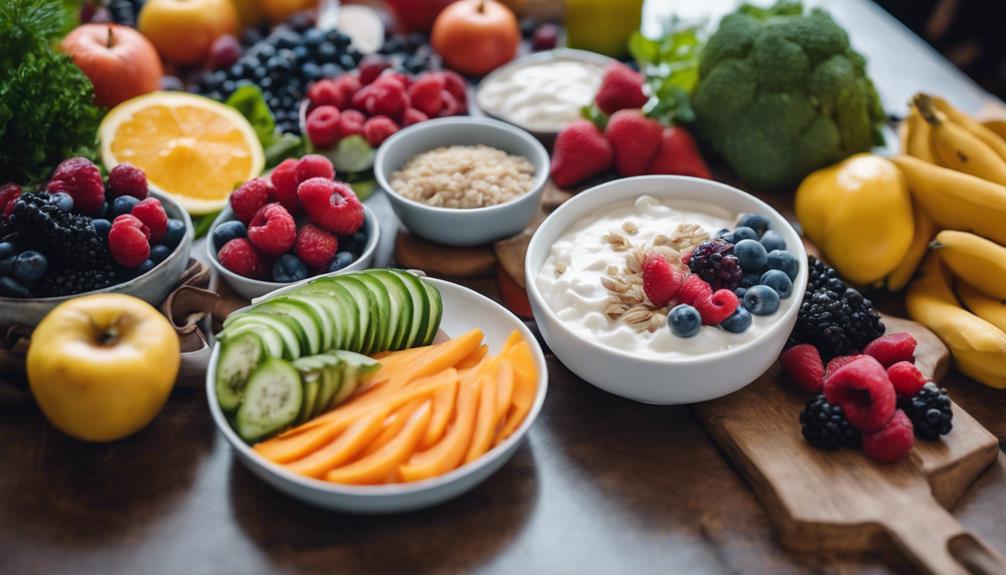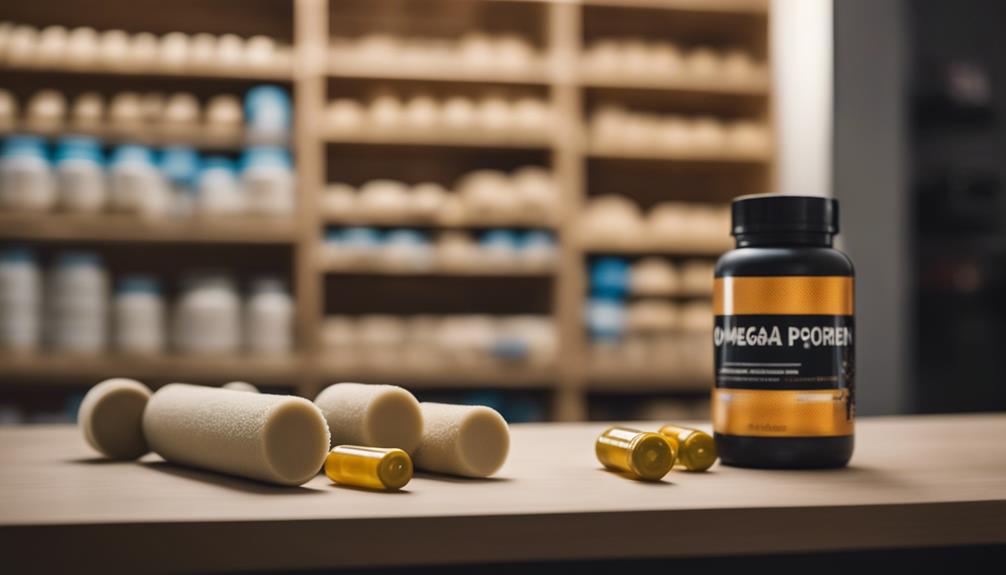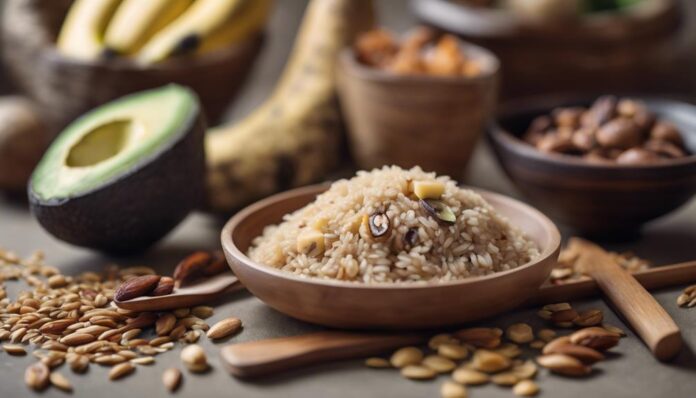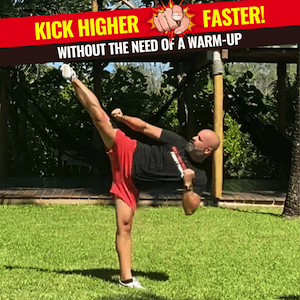As a martial artist over 40, you need a balanced diet that supports ideal performance and recovery. Aim for a macronutrient ratio of 50% carbs, 25% protein, and 25% healthy fats, and prioritize high-protein foods like lean meats, fish, and plant-based options. Hydrate by consuming 3.7 liters of fluids daily and replenish electrolytes during intense training. Prepare meals in bulk, timing them around workouts, and consider supplements like BCAAs, omega-3s, and creatine to enhance recovery. Focus on nutrient-dense foods, including fruits, vegetables, and whole grains, to combat inflammation and oxidative stress. By following these guidelines, you'll be well on your way to enhancing your nutrition plan and revealing peak performance.
Key Points
- Aim for a balanced diet with 50% carbohydrates, 25% protein, and 25% healthy fats for optimal performance.
- Consume 1.2-2.0 grams of protein per kilogram of body weight daily for muscle maintenance and recovery.
- Prioritize complex carbohydrates, reducing simple sugars to avoid energy spikes and crashes during training.
- Include fatty fish, nuts, seeds, avocados, and olive oil for a balanced intake of omega-3s and monounsaturated fats.
- Aim to consume 3.7 liters of total beverages daily and replace lost fluids and electrolytes during intense training.
Nutrition Plan for Optimal Performance
To fuel your martial arts training effectively over 40, you'll want to focus on a well-structured nutrition plan that prioritizes peak performance. Aim for a balanced macronutrient ratio of approximately 50% carbohydrates, 25% protein, and 25% healthy fats to support energy levels and recovery during intense training sessions.
Incorporate high-quality protein sources, such as lean meats, fish, legumes, and dairy, in your meals, especially after workouts. Target 20-30 grams of protein per serving to help repair muscle tissues and support muscle growth.
Emphasizing the intake of antioxidants from fruits and vegetables will also help combat inflammation and oxidative stress, which can be especially beneficial for recovery and long-term health in older athletes.
Make fruits and vegetables a staple in your nutrition plan, as they provide essential vitamins, minerals, and antioxidants. Include a variety of colorful fruits and vegetables in your meals to guarantee you're getting a broad range of nutrients.
Importance of Hydration and Electrolytes
Your well-structured nutrition plan is in place, and you're fueling your martial arts training effectively. Now, it's time to focus on the often-overlooked aspect of hydration and electrolytes.
As a martial artist over 40, proper hydration is vital for maintaining physical performance. Aim to consume about 3.7 liters of total beverages daily to guarantee you're adequately hydrated.
During intense training sessions, you can lose significant amounts of fluids through sweat, which can impair performance and reaction times. It's important to replenish lost electrolytes, such as sodium, potassium, and magnesium, to prevent muscle cramping and promote recovery.
Electrolyte-rich beverages or supplements can be beneficial, especially after prolonged or strenuous training sessions.
Monitoring your urine color is a simple way to assess your hydration status. If your urine is a light lemonade shade, you're likely well-hydrated. Darker urine, however, may signify dehydration, which can hinder your martial arts performance.
Stay on top of your hydration and electrolyte levels to perform at your best. Remember, physical activity puts a strain on your body, so it's important to replenish what's lost to maintain peak performance.
Eating for Sustained Energy Levels
During your martial arts training, sustained energy levels are crucial for peak performance. A well-planned diet plays a significant role in achieving this.
To fuel your performance and sustain energy levels, you should consume 5-8 grams of carbohydrates per kilogram of body weight before training. Incorporating healthy fats, such as omega-3 fatty acids found in fish, can also help reduce inflammation and enhance recovery, supporting sustained energy during martial arts training.
Consuming a post-training meal that includes 20-30 grams of protein is crucial for muscle repair and growth, which can improve overall energy levels during subsequent training sessions.
Staying hydrated is also essential, as dehydration can lead to energy dips. Aim for 32-48 ounces of fluids for every kilogram lost during training.
A balanced diet that includes nutrient-dense foods like leafy greens, lean proteins, and whole grains can guarantee a steady supply of vitamins and minerals necessary for peak energy production and endurance. By fueling your body with the right foods, you can maintain your energy levels, support your personal health, and manage your weight effectively.
This, in turn, will help you perform at your best during martial arts training.
Meal Preparation and Timing Strategies
Effective meal preparation and timing can considerably boost your martial arts performance and overall health, especially when you're over 40.
Preparing meals in bulk at the beginning of the week can save time and guarantee a steady supply of nutritious options, making it easier to stick to a clean eating plan. This strategy allows you to plan your meals around your training schedule, guaranteeing you're fueling your body for peak performance.
Timing meals around workouts is essential for maintaining energy levels. Aim to consume a balanced meal with carbohydrates and protein about 2-3 hours prior to training. This allows for proper digestion and energy absorption.
Incorporating healthy snacks, such as nuts or protein bars, between meals can help maintain energy levels and support muscle recovery, especially for athletes training frequently.
To make meal preparation and timing more manageable, pre-portion meals and snacks into grab-and-go containers. Utilize timers or meal reminders to establish regular eating patterns, guaranteeing that meals are consumed timely to support metabolism and recovery.
Managing Weight and Body Composition

As you enter your 40s, managing weight and body composition becomes increasingly significant for martial artists. It's vital to maintain a healthy balance of body fat and lean muscle mass to enhance performance and reduce the risk of injury.
To achieve this, aim for a caloric deficit of 500 calories below your maintenance level, which can help promote fat loss and reduce body fat to 14% or lower.
Incorporating regular strength training into your regimen can help preserve lean muscle mass while losing fat. This is essential for martial artists over 40, as metabolism tends to slow with age.
Prioritizing high-protein foods, aiming for about 150 grams daily, supports muscle recovery and growth while enhancing satiety, which aids in weight management.
To adjust your nutrition strategy, focus on nutrient-dense foods like fresh vegetables, lean proteins, and healthy fats.
Adjust your carbohydrate intake based on training intensity, with higher intake on workout days and lower on rest days.
Choosing the Right Macronutrients
To optimize your performance and recovery as a martial artist over 40, you'll want to focus on the right balance of macronutrients in your diet. This means understanding the importance of protein intake, carbohydrate balance, and healthy fat sources, and how to incorporate them into your daily meals.
Protein Intake Guidelines
Optimizing your protein intake is essential when you're a martial artist over 40, given the natural decline in muscle mass that comes with aging.
As you age, your body's ability to build and repair muscle tissue decreases, making it vital to consume enough protein to support muscle maintenance and recovery.
To achieve this, aim to consume 1.2 to 2.0 grams of protein per kilogram of body weight daily. Here are some key considerations for your protein intake:
- Post-workout protein: Include a source of protein within 30 minutes post-workout, aiming for 20-30 grams of high-quality protein.
- Variety of protein sources: Incorporate both animal and plant-based options to provide essential amino acids and improve overall nutrient intake.
- Even protein distribution: Spread protein intake evenly across meals, aiming for approximately 20-30 grams per meal.
- Complementary healthy fats: Focus on omega-3 fatty acids from sources like fatty fish and walnuts to support joint health and reduce inflammation.
Carbohydrate Balance Strategies
When it comes to fueling your martial arts training over 40, finding the right balance of carbohydrates is vital for performance and recovery. Aim for a carbohydrate intake of 5-8 grams per kilogram of body weight before training to maximize energy levels and support muscle preservation.
Prioritize complex carbohydrates, such as whole grains and starchy vegetables, which provide sustained energy compared to simple sugars that can lead to energy crashes.
On high-intensity training days, a macronutrient ratio of approximately 50-60% carbohydrates is recommended to adequately fuel performance and recovery needs. This helps guarantee you have enough energy to power through rigorous workouts.
Incorporating a variety of fruits and vegetables also helps guarantee a rich source of vitamins, minerals, and fiber, essential for both energy metabolism and overall health as the body ages.
Adjust your carbohydrate intake on low-intensity and rest days to around 45-50% to manage body composition and support recovery without excessive caloric intake.
Healthy Fat Sources
Fueling your martial arts training over 40 requires careful consideration of your fat intake, as healthy fats play a critical role in maintaining hormonal balance, energy levels, and overall performance.
As you age, your body's ability to produce hormones like testosterone declines, and healthy fats can help mitigate this effect.
When it comes to choosing the right fats for your martial arts training, focus on these key sources:
- Fatty fish: Fatty fish like salmon are rich in omega-3 fatty acids, which provide anti-inflammatory benefits and support joint health.
- Nuts and seeds: Almonds, flaxseeds, and chia seeds are all high in healthy fats and can be easily incorporated into your diet.
- Avocados: Rich in monounsaturated fats, avocados support heart health and can improve your overall physical performance.
- Olive oil: Use olive oil as a healthy alternative for cooking and dressings, as it's rich in monounsaturated fats.
Remember to avoid trans fats, which can increase inflammation and hinder your training and recovery efforts.
Aim for a balanced ratio of omega-6 to omega-3 fatty acids to optimize your martial arts performance and recovery times.
Supplements and Recovery Aids

As you progress in your martial arts journey over 40, you're likely to experience increased muscle soreness and fatigue. To alleviate these symptoms, consider incorporating supplements into your regimen.
Branched-chain amino acids (BCAAs) can help support muscle recovery and reduce soreness after intense training sessions. Omega-3 fatty acids, found in fish oil supplements, are effective in reducing inflammation and promoting joint health, vital for recovery as workout intensities increase with age.
Other supplements can also aid in recovery and muscle function. Creatine monohydrate has been shown to enhance recovery and increase muscle mass, making it a worthwhile consideration for martial artists looking to improve performance and recovery.
Magnesium supplements can help improve sleep quality, muscle function, and reduce fatigue, contributing to better overall recovery. Additionally, probiotic supplements can enhance gut health, which is essential for nutrient absorption and overall immune function.
In Summary
You've learned the essential nutrition tips to optimize your martial arts performance over 40. By prioritizing a balanced diet, staying hydrated, and managing your weight, you'll be able to train more effectively and recover faster. Remember to choose the right macronutrients, prepare meals strategically, and consider supplements to aid in recovery. With these tips, you'll be able to maintain peak performance and continue to excel in your martial arts journey.



